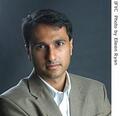weekly column
|
Each week, find a commentary on something connected to verses of Torah or another source of wisdom
|
|
Each week, find a commentary on something connected to verses of Torah or another source of wisdom
|
 Wisdom Wherever You Find It You have a choice whenever you encounter something from another tradition. You can look for the differences, or you can find the resonances. I advise you to find the resonances. Sadruddin Patel Here is a piece of advice that a young Eboo Patel received from his father. It is among the things that propelled him down an extraordinary journey among people of many faiths and none at all. Sadruddin was a Shia Muslim, a Gujarati from the Indian subcontinent. (Gandhi, a Hindu, was likewise Gujarati.) Eboo was raised in a multicultural community outside of Chicago, and not always happily. I think about this piece of advice a lot. It strikes me as one of the more effective antidotes to the poison we have ingested as a society in which every difference is weaponized for local gain. There is simply a stunning amount of umbrage that is provoked by the plain notion that someone may have a distinct point of view from your own. And while I might find some level of understanding if the subject were the now-infamous “deeply held personal convictions,” the fact is friendships and families have been torn apart over the gentlest exercises of constitutional rights. The senior Patel’s instruction was about religious diversity, and I will stick with it for a moment before I come back to its larger implications. I have written before about my own reluctance in my younger days to consider favorably the beliefs and practices of others. I looked for the differences. I will go so far to admit I took offense at the affirmations of others that differed from my own. I think I was probably pleasant enough about it outwardly, but I know my inner commentator was insisting that these poor self-delusional religious folks (including some who were Jews) were somehow missing out. I have spoken with enough people about faith and tradition in the intervening years to know that many of them felt the same about me. What changed? Honestly, it began with a conversation I had with a Presbyterian. I won’t do well explaining how a Presbyterian church works (or, at least, is supposed to work), but the premise is that everyone is taken care of. Like any congregation, the lay leaders deal with budget and bylaws, but there is an entire structure that makes leaders responsible to keep in touch with and address the concerns of every member. There are formal names and guidelines (which I never committed to memory), and the traditional iteration was pretty much White and male, but the notion struck a chord within me as a rabbi. Somewhat accidentally, I found a resonance. And once I was able to adapt that resonance to my own Jewish congregation, I found others from many other traditions. (Let me commend the Sikh practice of hospitality, for example.) The junior Patel used this and other bits of wisdom to become a remarkable leader in interfaith relations. As his father inspired him, he has inspired others to find resonances in other traditions. But it seems to me this is good advice not only for engaging with practitioners of other faith traditions. My aforementioned larger implications are about society in general, especially but not just politically. There are, to be sure, people who are immovable in their convictions. In other contexts, I have wondered whether they are motivated by conviction or fear, but it does not matter. Mr. Patel’s model was not addressed to the “other,” but to you. Independent of campaigns and elections, nominations and appointments, legislation and policy declarations, there is always – always – a resonance for you, however deeply muted. In any situation, the matter at hand can be most effectively dealt with when both parties’ concerns are addressed. Will someone be unhappy when they don’t get their way? Yes. But they will be less unhappy if the resolution resonates than if they are defeated by mere power. This is not the place for an extended example, but I will mention one: marriage equality. In less than a generation, the vast majority of the American community turned 180 degrees on the question because advocates presented the matter not as a matter of law but as a matter of love. Civil rights implications still present challenges to those whose “deeply held personal convictions” define their concerns, but overwhelmingly Americans resonated with the similarly deeply held personal conviction that you love whom you love, not the person you are told to love. For those who, like me, lean hard to the left on social issues, finding the resonances is no less important. There is always a choice when you encounter some from a different perspective. Like the senior Mr. Patel, I advise you to find the resonances. By the way, the picture above is not of Sadruddin Patel, but of his son, Eboo. More resonance.
0 Comments
Leave a Reply. |
Archives
October 2023
Categories |